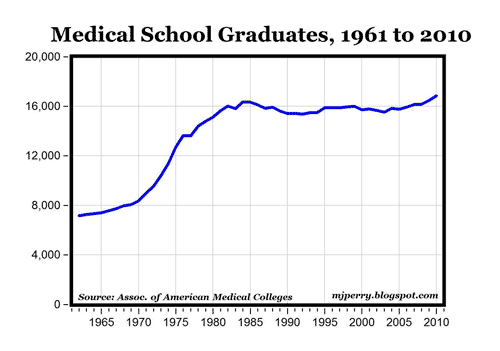From a recent Wall Street Journal editorial by Dr. Herbert Pardes, president and CEO of New York-Presbyterian Hospital:
“The doctor shortage was fostered in 1996 when Congress capped the number of new doctors Medicare would pay to train, a practice that continues to this day.
Health-care reform will add an estimated 32 million people to the ranks of the insured, driving them to seek medical attention that in the past they may have avoided due to expense. The aging population will also create much greater demand. The number of seniors who need more medical care is expected to soar to 72 million by 2020—nearly double today’s number.
According to a 2010 report by the Association of American Medical Colleges, the increased demand means that our nation will need an additional 130,000 doctors, both general-practice physicians and specialists, 15 years from now. That’s about 20% more doctors than we have currently.
Right now we train roughly 16,000 doctors a year. To keep pace with demand, this nation will need to train an additional 6,000 to 8,000 each year for the next 20 years. If we increased the number of training slots today, it would take seven to 10 years for the new doctors to see patients (four years of medical school, plus three years of residency and additional specialty training).”

MP: The chart above shows that the number of medical school graduates peaked at about 16,000 per year in the early 1980s, long before any Congressional cap of Medicare funding in 1996 for training doctors.
Why is it that we only hear about current or pending doctor shortages, but we never hear about shortages of other highly-trained professional like lawyers, engineers, computer programmers, Ph.D. history or political science professors, architects, economists, accountants, etc. For some professionals like lawyers and history professors, we actually hear about huge and rising surpluses. On the hand, we hear all the time about the proliferation of for-profit universities like the University of Phoenix, so the market for private, for-profit education is expanding and growing nationally to offer education for nurses and other medical careers.
Q: What is it about the medical profession that prevents it from supplying an adequate number of doctors to meet the rising demand, when every other profession seems able to accomplish that outcome? Why has the number of medical school graduates been basically flat for 30 years? I’m guessing that there must be restrictions that prevent the number of medical schools from increasing, but I’d welcome comments about this.
- Bulenox: Get 45% to 91% OFF ... Use Discount Code: UNO
- Risk Our Money Not Yours | Get 50% to 90% OFF ... Use Discount Code: MMBVBKSM
Disclaimer: This page contains affiliate links. If you choose to make a purchase after clicking a link, we may receive a commission at no additional cost to you. Thank you for your support!


You pose an interesting querie. One blunt answer is ‘perception is reality’. The daunting challenge of multiple years of school after college, more training, plus residency coupled with the anxiety over getting into a ‘good school’ – paying for the education – finding a good mentor,etc. These are major road blocks. Also the current system was organized under a different period in our history and should be updated to fit current trends and needs.
Doctors act like a cartel. Here, in Brazil, new courses of medicine are not allowed in order to keep their salaries as higher as possible.